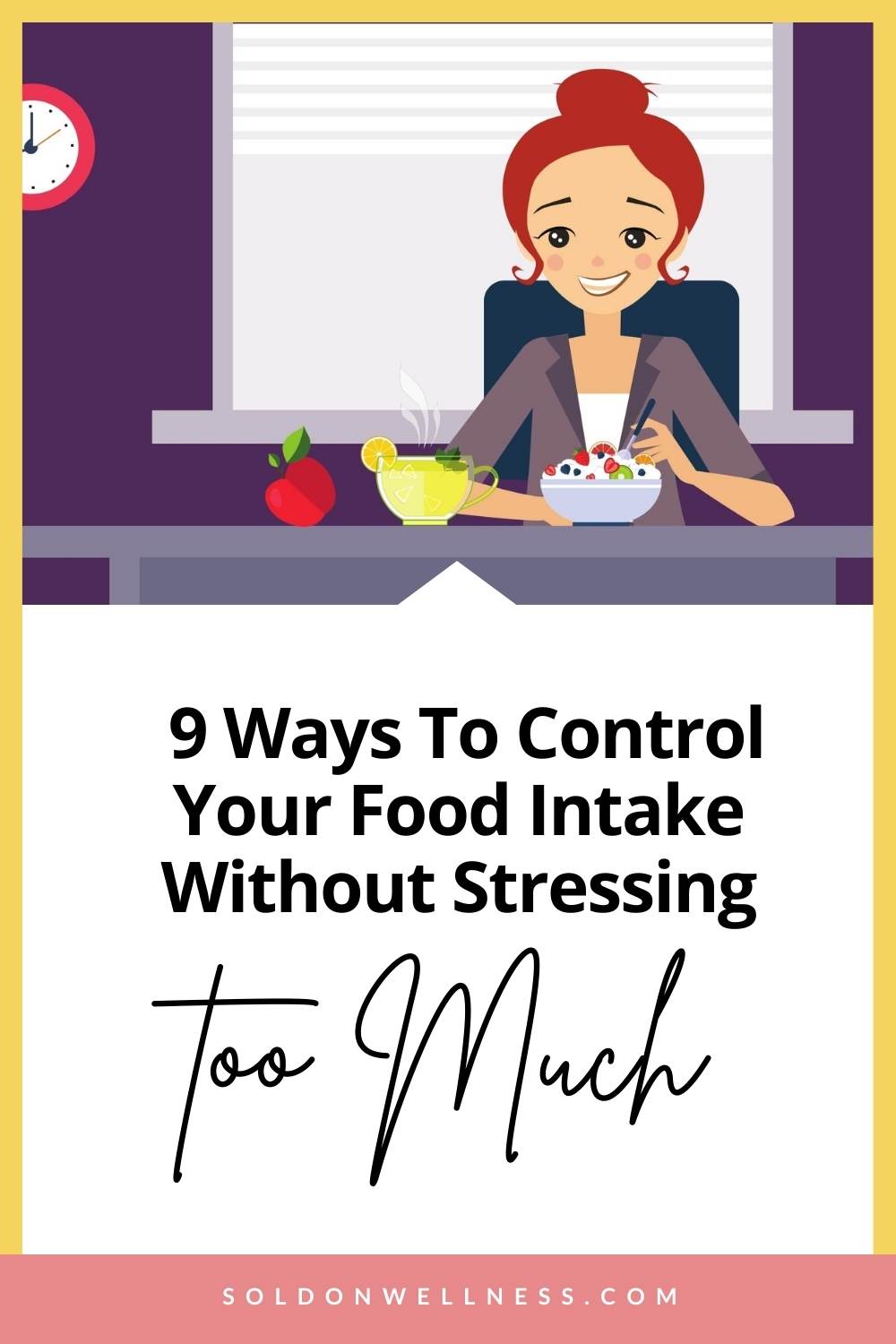How to control stress eating is a possibility that comes with willpower. Stress eating is a natural response to pressure and can be very difficult to control.
However, there are several ways how you can get better at dealing with your stressful eating habits and how you can stop this pattern before it starts.
This is a difficult topic to talk about because we’ve all been there. You just finished an intense workout and feel like you deserve a reward for how hard you pushed yourself, so now it’s time to go home and crack open that bag of chips or order that pizza with extra cheese.
There are moments when the temptation is too hard to resist, but luckily there are also strategies and methods for how to deal with this problem in more healthy ways than bingeing on junk food when things get tough.
In this article, I am going to outline how over-eating may be holding you back from reaching your health and fitness goals, how you can beat stress eating, how to control your food intake better without stressing about it too much, how to incorporate healthy foods that will satisfy your cravings in a healthier way, and how to find comfort during stressful periods of life.
What is stress eating?

Stress eating is defined as the psychological and physiological urge people feel to eat when they are stressed. Stress can be caused by many things including work, school, family, or a significant other.
Stress eating is also called "comfort eating" because it usually involves foods that are considered comforting like ice cream, cookies, cakes and chocolates.
People who stress eat usually want to feed their emotional hunger as well as their physical one.
How stress affects your eating habits
Stress affects how people feel about food, how they eat it and how much of it they need in order to feel satisfied. Stress eating can be an unhealthy way for a person to cope with stress.
In fact, being stressed too often can lead to a binge eating disorder or an eating disorder such as bulimia nervosa or anorexia nervosa.
9 ways to control your food intake without stressing too much

The first thing you need to do is identify how you are feeling. Is it because you didn't have enough sleep this week? Are you really hungry?
Or is it because there is a lot going on in your life right now and the stress is getting to you? Once you know how you're feeling, try one of these methods below:
1. Exercise
One of the best ways to get rid of your stress is by exercising. Not only will this make you less hungry, but it will also help clear your mind and leave you feeling refreshed about how things are going in your life.
Go for a run around your neighbourhood, or simply take out the trash instead of leaving it there until later. Whatever you do, make sure it's something physical that will help release your stress and calm you down.
2. Eat Mindfully
While this may seem like an oxymoron, eating mindfully can reduce how much you're eating and how much you eat altogether.
When we snack, we don't think about how many calories or how much fat is in the food that we are eating. Instead of trying to restrict yourself from eating your favourite foods completely, try to eat smaller portions of your favourite foods.
By doing this, you'll end up eating less overall and you won't have the guilt associated with how many calories or how much fat you're consuming.
3. Eat Slowly
One way that stress eating can be harmful is how quickly we consume our food when we are stressed out about how fast we're eating.
If you are a stress eater who wolfs down their food in an instant, it is time to slow down how fast you eat.
To do this, try setting a timer for how long you can take to finish your meal or how much time it will take to chew and swallow each bite of food that you have taken.
By taking your time and eating slower, you will be able to notice how much more room you have left without feeling stuffed.
4. Keep Healthy Snacks on Hand
Instead of having processed snacks waiting for you in the cupboard or in the refrigerator, keep things like fruits and vegetables by the side instead.
Not only do these things not add any extra calories to your daily intake, but they can also help you feel full without feeling guilty for how much food you ate.
5. Schedule Meals
You may have a stressful job or a lot going on in your personal life, and as a result, it's easy to forget about how many hours have gone by since the last time that you ate.
Try to keep a schedule of how often you eat and how many calories you are consuming. This will help remind you that it's time to eat again so that you don't have to worry about how much longer before your next meal.
6. Forgive Yourself
It is natural for us to want the best of everything, especially when we are working hard to achieve a goal. However, there comes a point when it is alright to forgive and forget how stressful things are at the present moment.
When we allow ourselves to get overwhelmed by how fast life can move, it is easy to let our stress eating habits take over how our body looks and feels.
Instead of getting caught up in how you can't control how you eat and how you look, try to forgive yourself for how stressed out you are feeling at the moment. You can always start again tomorrow.
7. Join a Support Group
It is harder to resist stress eating when there's no one else who understands how it feels to be as overwhelmed by how fast your life moves along as how you feel.
While it may seem like a lot of work, joining a support group can help you connect with how other people are feeling and how they deal with the same stress eating issues that you face.
By allowing yourself to vent about how much pressure you're under at any given time, it will be easier for you to control how stressed eating can sometimes get the best of you.
8. Remember Why You Are Doing This
When we start to feel how stressed eating can be, it is easy to forget how important it is for you to stay in shape and how much your stress eating habits are hurting how much lean muscle mass you have in your body.
Instead of allowing yourself to wallow in how overwhelmed you feel, it is important to remember how much healthier you will be if you learn how to control your stress eating habits once and for all.
9. Ask a Friend for Help
Since there's no way that we can do everything on our own when we are feeling how stressful life has become, it is critical that you ask someone for help.
By allowing someone to assist you, it will be easier to find new ways on how you can control your stress eating habits without feeling guilty about it.
If nothing else, ask a friend to join your support group so that they can share how they handle their stress eating issues with you and the rest of the group.
Incorporating healthy foods

You can incorporate healthy foods that will satisfy your cravings in a healthier way by finding healthier alternatives. For example, if you are craving something sweet but you don't want to eat candy, try having some fruit or berries.
If you crave salty foods, instead of chips or french fries, try some carrot sticks with ranch dressing! This way you can enjoy your cravings in a much healthier way and it won't be quite as bad for your body!
I like to incorporate healthy foods that will satisfy my cravings in a healthier way. One example is adding veggies to make my favourite pasta dish. Just taking one step towards making healthier choices can make a big difference!
Rather than reaching for the crackers, I could use some almonds and celery as my go-to snack, There are so many ways you can incorporate healthy snacks, take time to imagine and figure out what would work for you.
You might also like:
15 Foods That Reduce Stress Levels You Can Try Today
13 Delicious Anti-Inflammatory Foods List
How To Start A Clean Eating Diet
Finding comfort during stressful periods of life
There are four easy exercises that can help you identify the source of discomfort and make you recognize all possible coping mechanisms.
1. Make a list of stressful situations that can cause overeating
People eat for different reasons and in response to various stimuli. However, some common situations that are often associated with stress eating include:
- Periods of fatigue or exhaustion (after studying at night, after work);
- The need to relieve boredom;
- Feelings of frustration, anger or depression.
2. Dividing the reasons into two categories:
Physical and Psychological discomfort
The symptoms of these conditions can be quite different, as well as their causes. First, let us determine what type of stress eating you experience when faced with a challenge.
We have already seen that stress can cause overeating for different reasons – physical and psychological discomfort, as well as the need for pleasure.
Physical discomfort
Physical discomfort can usually be relieved only by eating food that has a soothing effect on the body: carbohydrates, sugar, and salt.
Make a list of healthy snacks that can be eaten in stressful situations (for example, banana slices with peanut butter, whole wheat crackers with cheese and cottage cheese, dry cereal bars with milk, boiled egg whites).
Psychological discomfort
Psychological discomfort is associated with eating for pleasure (sweet or salty snacks, etc.).
Make a list of healthy foods that can be eaten for pleasure (for example, fresh strawberries, banana or mango slices, cooked celery sticks).
Dividing discomfort into two groups will help identify possible moments of overeating and the most frequent types of stress eating for each category.
This will allow you to determine the most appropriate methods for dealing with these challenges.
3. Gather information about the types of stress eating in more detail
For example, what is your favourite food when you're sad? And do you eat it right away or postpone this pleasure.
It is essential to know what type of food you are most likely to grab at in a stressful situation and how soon for this.
4. Feed yourself but in a healthy way (do not force yourself to eat)
It is very important to eat consciously, fully appreciating the smell and taste of the food.
Do not turn eating into a mechanical action – try to recall what was happening before you started eating: did you just solve an unexpected problem or buy a new item for your wardrobe?
By connecting "food" and "pleasure", you can reduce not only the danger of eating more than needed but also the likelihood of overeating in stressful situations.
5. Protect yourself from possible temptation
We all know about the saying "out of sight, out of mind". But we tend to forget that our minds can sometimes be influenced by external factors. For example, when some food is in the kitchen, it's pretty hard not to think about it.
It doesn't even have to be something that you usually crave – a chocolate cake can work just as well! Try putting tempting foods out of sight and reach.

Final Thoughts On How to Control Stress Eating
If you feel like stress-eating because of a busy day or overwhelming workload, take some time out for yourself. Spend 10 minutes doing something that makes you happy before diving back into work.
You can also try to do things that make your body relax such as taking a hot bath or listening to soothing music without any distractions in order to combat stress and anxiety associated with the fast-paced world we live in today.
Additionally, if there is anything going on at home causing emotional distress it would be beneficial to deal with those issues head-on so they don’t continue adding more pressure onto your shoulders.
If all else fails, find someone who will listen and talk through what's bothering you until the weight becomes less heavy. In most cases talking about it is half the battle.
As a last resort, it may be time to call in professional help. Many health care professionals are trained in helping people cope with stress and anxiety issues including dieticians, psychologists, nutritionists and psychiatrists.
Talking to someone who can listen without being judgmental can really make a difference.
If you found this article helpful, please consider sharing it with others. Drop any questions and comments below. I will love to chat with you.
Kitchen gadgets That Can Help
More resources
Why stress causes people to overeat





![Ninja Food Processor with Auto-iQ [BN650UK] 850W, 2.1L Bowl](https://m.media-amazon.com/images/I/71sq9MIJSeL._AC_SX522_.jpg)
![Ninja Foodi Mini Oven [SP101UK] 8-in-1 Flip Mini Oven, Air Fryer, Bake, Grill](https://m.media-amazon.com/images/I/618V2xkA9cL._AC_SX569_.jpg)

